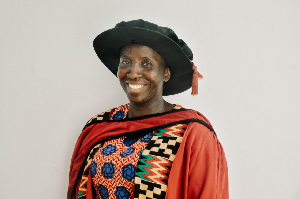As Ghana grapples with a severe drought due to erratic rainfall patterns, threatening food availability and nutritional security, one scientist stands at the forefront of innovative research that could help mitigate these challenges.
Dr. Stella Owusu-Nketia, a distinguished plant scientist at the Department of Crop Science, University of Ghana, is making remarkable strides in improving rice resilience to drought stress through root system modification.
Central to Dr. Owusu-Nketia's research is the recognition that the root is a critical organ for plant survival. It serves as the primary interface between the plant and the soil, facilitating the uptake of water and nutrients essential for efficient plant growth and development. In the face of environmental stresses like drought, the root system becomes even more crucial, determining a plant's ability to access limited resources and survive.
Dr. Owusu-Nketia's groundbreaking work focuses on enhancing the root system architecture of rice plants under soil moisture fluctuation stress. This research is particularly crucial for rain-fed rice cultivation ecosystems, which is typical of Ghana’s crop production system, where plants frequently experience alternating periods of prolonged drought and rainfall.
Such fluctuating moisture conditions pose significant stress to plants, but Dr. Owusu-Nketia's research has revealed that some rice varieties possess adaptive mechanisms, showing remarkable root plasticity in response to these stress conditions.
The importance of Dr. Owusu-Nketia's work cannot be overstated, especially in the context of Ghana's current agricultural crisis. Her research into root plasticity under fluctuating soil moisture stress has shown promising results.
By focusing on the root system, she is addressing the most fundamental aspect of plant resilience. In one of her remarkable studies, she examined some backcross inbred lines of rice and reported on how certain genetic regions can enhance a plant's ability to adapt to varying moisture levels through modifications of root architecture.
Dr. Owusu-Nketia's expertise extends beyond just theoretical research. She has been instrumental in evaluating the functional roles of root plasticity and its contribution to water uptake and dry matter production in rice varieties. Her work has shown that improved root systems can significantly enhance a plant's ability to access water and nutrients, even under stressful conditions, thereby improving overall plant performance and yield stability.
The implications of Dr. Owusu-Nketia's research are far-reaching. By developing rice varieties with enhanced root systems, farmers could potentially achieve high crop yields even in the face of unpredictable rainfall patterns. This could be a game-changer for Ghana's agriculture sector, which is currently reeling under the impact of drought. Her focus on root system improvement addresses the core of plant resilience, offering a sustainable approach to crop enhancement.
As Ghana faces the prospect of food insecurity due to the ongoing drought, Dr. Owusu-Nketia's research offers a beacon of hope. Her work on root system modification could pave the way for more drought-resistant rice varieties, helping to ensure food security even in the face of climate change-induced weather patterns.
By targeting the root system, she is enhancing the plant's primary organ for survival, potentially revolutionizing how we approach crop resilience in challenging environments in future research efforts.
The scientific community eagerly anticipates further developments from Dr. Owusu-Nketia's lab. Her innovative approach to understanding and enhancing plant root systems could revolutionize how we breed crops for resilience in an increasingly unpredictable climate.
As Ghana and other African nations continue to face agricultural challenges, the work of scientists like Dr. Stella Owusu-Nketia will be crucial in safeguarding food security and supporting sustainable agriculture by focusing on the most fundamental aspect of plant life – the root system.
Click to view details



Opinions of Friday, 15 November 2024
Columnist: Benjamin Adjei
Pioneering rice root research to combat Ghana's drought crisis
Opinions


















